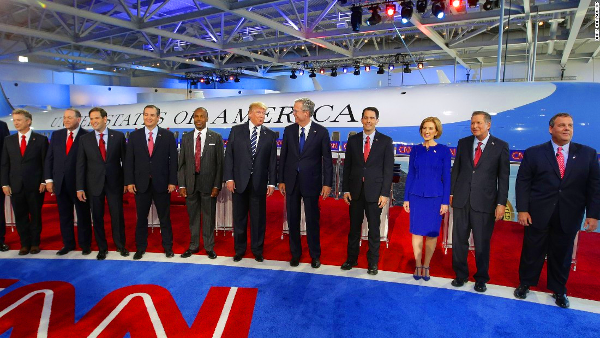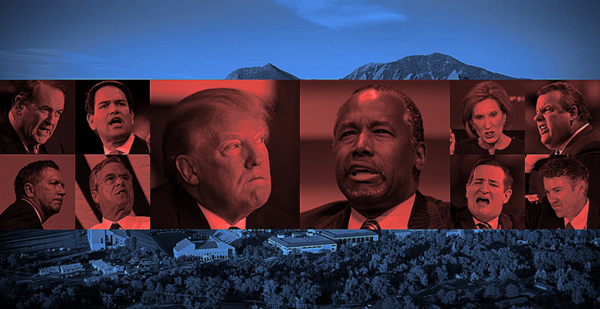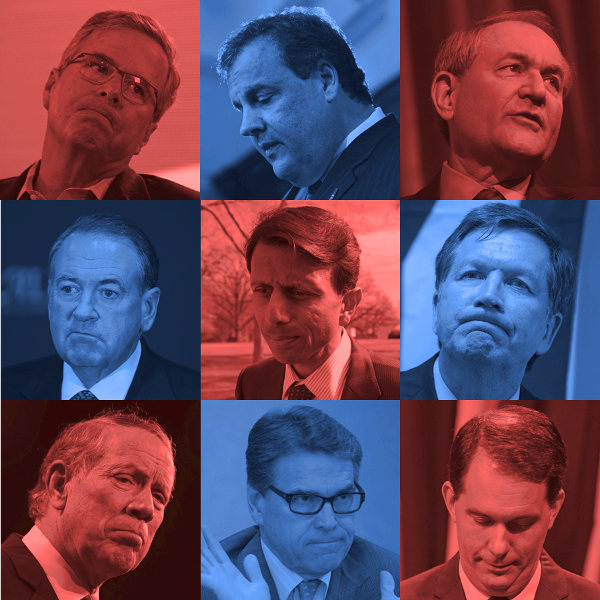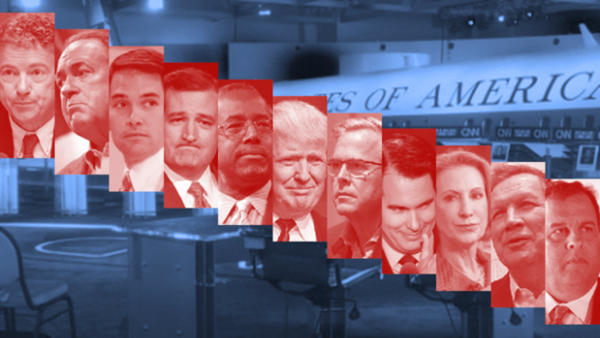
If your debate-watching drinking game involved taking a swig every time a candidate or moderator invoked Ronald Reagan, please get your stomach pumped as soon as possible. We all knew the Republican presidential hopefuls on stage would pay homage to their party’s hero, surrounded as they were by memorabilia from his administration. What we didn’t know was how much time they would spend talking about one another.
Often the most frustrating moments for moderators are when candidates pivot from specific questions to their rehearsed stump speeches. This can be a great security blanket for candidates who feel more comfortable retreading practiced rhetoric than thinking on their feet. But with Tapper, Bash, and Hewitt pushing for confrontation and tensions high within the field, fights were bound to happen. And happen they did.
As the dust began to settle, head moderator Jake Tapper asked each candidate to give himself or herself a Secret Service nickname. DebateWatch isn’t convinced that these nicknames are especially useful as heuristics for voters, but we present them below alongside their corresponding candidates as we work through the rankings from last to first…
11. BEN CARSON (“ONE NATION”)
The question that perennially swirls around non-politician candidates is whether they have the necessary policy expertise to succeed in the Oval Office. Dr. Carson benefited from being in the “getting to know you” phase of the campaign in the Fox News debate last month, when he cultivated a nice-guy persona and wasn’t challenged on policy specifics. Going into Simi Valley, Carson’s debate strategy was the same as the last time around – just be yourself.
Unfortunately, himself wasn’t particularly articulate on policy matters when pressed by the moderators. Carson spoke in broad brushstrokes about uniting the country, but aside from shrewdly correcting Tapper on what he considered mischaracterizations of his policy proposals, Carson had little more to offer than that. In a debate all about conversations and confrontations, the Marylander shied away from arguing with other candidates, and his opponents generally left him alone. DebateWatch anticipates that the neurosurgeon’s impressive poll numbers will not stay as high as they are for long if this performance is indicative of future ones. Of all the candidates on the main stage, Carson still seems the least equipped to debate Hillary Clinton or whatever nominee the Democrats put forth in a general election.
10. JEB BUSH (“EVERREADY”)
Mark Twain once advised “Never argue with stupid people, they will drag you down to their level and beat you with experience.” Governor Bush’s campaign may not have specifically called Donald Trump stupid, but the two camps have been at each other’s throats for most of the early primary slog. In Cleveland, Bush strove to stay above the polemical fray, but his new “high energy” debate strategy drove him to engage in tiff after tiff with the real estate tycoon throughout the night. Snarky back-and-forths are Trump’s home turf, and the home field advantage was eminently apparent.
When he wasn’t dancing with the Donald and getting his toes stepped on, Bush struggled to achieve an air of sincerity. His stilted speaking style seemed calculated and suppressed, as though he were constantly self-censoring to avoid committing gaffes or showing anger. Ironically, the moment when Bush appeared to come closest to losing his temper – defending his brother’s foreign policy to great applause – was his most candid moment. Playing not to lose in Cleveland may have lost Bush some percentage points in the polls, but trying to beat Trump at his own game will not regain them.
9. DONALD TRUMP (“HUMBLE”)
Eleventh-place Rand Paul shouldn’t even be on stage; Fiorina’s company is a disaster; Rubio has the worst voting record in the Senate; Bush is soft on immigration because of his Mexican wife. The Trump strategy has always prioritized zingers over policy specifics, and the second debate was another opportunity for Trump to please supporters who see him as being the only person willing to speak truth to power.
Trump’s performance was probably not poor enough to drive his numerous supporters to other candidates. That being said, it was a major step down from his Cleveland appearance. Perhaps the difference this time was the element of surprise – before the first debate, Trump’s opponents were unsure of what to expect from what a Kasich staffer referred to as the political equivalent of a drunken NASCAR driver. In Simi Valley, both Fiorina and Bush skewered Trump on his multiple bankruptcies, and the Donald was less effective in countering their barbs. Later, he seemingly outed himself as an anti-vaxxer before backtracking. Trump has yet to prove his ability to successfully improvise under the klieg lights, and he will need to do so soon lest his supporters tune in to debates and news coverage and tire of the same soundbites.
8. JOHN KASICH (“UNIT ONE”)
Governor Kasich was a big star in the Cleveland debate after making the cut by the skin of his teeth. Energized by a hometown crowd and effortlessly speaking with poise and authenticity, he looked like a palatable establishment alternative to Jeb Bush in the compassionate conservative category.
DebateWatch had high expectations for the Ohioan going into the second debate, but we were baffled at the first half of his Simi Valley performance. As the discussion turned to the unpopular Iran nuclear deal, Kasich inexplicably moved to defend the Obama administration’s negotiation tactics, arousing the perplexed ire of his opponents. Later in the evening, Kasich returned to form and made a reasonably successful attempt to be the adult in the room while others squabbled. But the foreign policy move leaves us unsure about Kasich’s discipline at the podium, and the specific stances he took may come back to haunt him in the future.
7. MIKE HUCKABEE (“DUCK HUNTER”)
In Cleveland, Governor Huckabee found himself in a tit-for-tat with Chris Christie over entitlement reform for which he seemed unprepared. This time, his lines did not engender any such mini-debates. In fact, almost everything he said was compatible with all the other primetime candidates’ positions on the issues. In fact, almost everything he said could just as well have been said by anyone else on stage without anyone thinking “Hey, that sounds like Mike Huckabee!”
Huckabee’s talking points were unobjectionable but so non-individuating that they might as well have come from Reince Priebus or some RNC lackey representing the collective id of the Republican Party. While Bush, Christie, Kasich, and Walker hawked their records, Huckabee was silent about his. The Arkansan offered plenty of reasons to vote for the GOP nominee in the general election but virtually none for why he should be that nominee. Psephologists searching for the most neutral – not helping, not hurting – primary debate performance might have found their answer in Huckabee’s.
6. RAND PAUL (“JUSTICE NEVER SLEEPS”)
In the first debate, Senator Paul didn’t even wait until the first response had concluded before interrupting and attacking Trump. In the second one, Paul complained about the “sophomoric” interpersonal attacks Trump was levying against the field, and kept a minor feud smoldering between himself and Trump throughout the night.
However, DebateWatch was surprised to find Paul exceeding our performance expectations more than any other candidate on the stage. Paul’s dovishness on foreign policy was not presented as brashly as it often has been, and a surprise questioning round on marijuana legalization gave him a chance to one-up his opponents on a policy area he had spent far more time than his opponents prepping. The ophthalmologist even seemed to be enjoying himself on stage, jokingly referring to a follow-up he gave after one of Dr. Carson’s answers as a “second opinion.” Paul’s path to the nomination is less discernible than most candidates’, but performances like this one are undoubtedly an important step.
5. TED CRUZ (“COHIBA”)
Love him or hate him, one thing is patently obvious about Senator Cruz: he fervently believes every word he says. The Texan iconoclast delivered his lines staring directly at the camera with a practiced intensity befitting a former Harvard debater and solicitor general. Again offered a smaller than average slice of the television-time pie, Cruz milked every second, turning his answers into miniature fireside chats.
Cruz’s sincerity clashed with Bush’s woodenness in an exchange between the two over Supreme Court justice nominations. With Bush defending his father and brothers’ picks for the bench (already an awkward moment for a candidate trying to downplay his family history), Cruz took a stand for committed conservative justices so stoically that his campaign team cut the debate clip and released it on their own YouTube channel. He may be back in the polls at press time, but Cruz has been in the 2016 race the longest and has yet to stumble on the debate stage.
4. SCOTT WALKER (“HARLEY”)
Governor Walker was once the darling of Iowa voters. Since then, his poll numbers in the Hawkeye State have tanked, and his non-confrontational demeanor at the Cleveland debate left many questioning his viability. More than any other candidate going into Simi Valley, Walker was in desperate need of a debate strategy reboot.
He got one. Walker’s answers were hardly different from the ones he gave at the last debate (or the planks in his stump speech), but he managed to hit upon a successful tactic early on that paid dividends throughout. Placed adjacent to the Trump-Bush pissing contest, Walker interjected several times to break up the fight and put forth his own record and recommendations. It took him a few tries to get right, but the implication was clear: Bush and Trump only care about fighting each other, but I have real workable ideas, and “we don’t need an apprentice in the White House.” Walker would do well to keep up this new rhetorical strategy in coming contests, and to refine it further.
3. MARCO RUBIO (“GATOR”)
Senator Rubio was the surprise winner of the Fox News debate in August by DebateWatch’s reckoning. He started things off in CNN’s contest by proudly displaying the water bottle he had brought along with him, indulging in a laugh about his desiccated State of the Union response.
With so much of the debate focused on foreign policy, Rubio had much fewer opportunities to expound upon his economic platform that went over so well in Quicken Loans Arena. Luckily for the Floridian, his talking points on Iran, Russia, and other pressing issues were well polished. Rubio was unflappable even as Trump attempted to trip him up by needling him for missing Senate votes; rather than deflect, he eagerly defended his prioritizing of campaign over Congress and won the audience over to his side. DebateWatch wasn’t sure whether to label Rubio’s stellar appearance in Cleveland a fluke; now it is apparent that Rubio really is this effective at impromptu answers.
2. CHRIS CHRISTIE (“TRUEHEART”)
“Hi, my name is Chris Christie, and I’d like to you take the camera off me and put it on the audience….” Thus began the best opening statement DebateWatch can remember seeing. Governor Christie entered the Reagan Library with an agenda: sell his record from the Garden State and make a play for the struggling middle class.
Except for a strange moment where he criticized Carly Fiorina and Donald Trump for talking about their records as CEOs instead of the plight of the jobless (what else are Fiorina and Trump supposed to talk about?), Christie effectively stuck to his message and style. He also managed to add depth to his no-nonsense persona by recounting the harrowing five hours on September 11, 2001, when he didn’t know whether his wife (who worked mere blocks from the World Trade Center) was alive or dead. Like Cruz, Christie is effortlessly authentic on the stump or the debate stage. If he can’t climb out of his polling hole after stringing together performances like this one, he can take cold comfort in the fact that he gave the campaign his very best shot.
1. CARLY FIORINA (“SECRETARIAT”)
Winning two debates in a row is one thing. Winning two debates in a row after having been kicked up to the big leagues is something else entirely (maybe having a triple crown winner as a codename is fitting). Everyone was waiting for Carly Fiorina to get a chance to respond to Donald Trump’s critiques about her fitness to lead; after punting on her first chance, Fiorina deftly demurred: “I think women all over this country heard very clearly what Mr. Trump said.”
But the real highlights of Fiorina’s debut on the main stage were her forceful cadenzas that drew applause and admiration on almost every topic she had a chance to address. Whether it was treading old ground on presumptive Democratic nominee Hillary Clinton, ticking off figure after figure of foreign policy expertise, or making emotional appeals on abortion and drug addiction, Fiorina was ruthlessly effective at getting a rise out of the crowd. Even when pressed on her key vulnerability – her controversial tenure at Hewlett-Packard – Fiorina never flinched. From our perspective, there is no debate about this debate: DebateWatch declares CARLY FIORINA the winner of the CNN Reagan Library primetime debate.
Which candidate do you think we overrated the most? Underrated the most? Tell us in the reply section below, and don’t forget to come back in the weeks ahead as we preview the first Democratic contest coming in October, as well as other debate-related events that could change the course of the nomination races.




